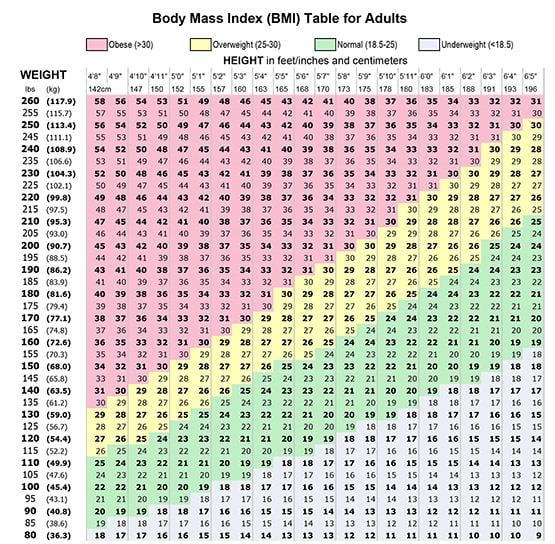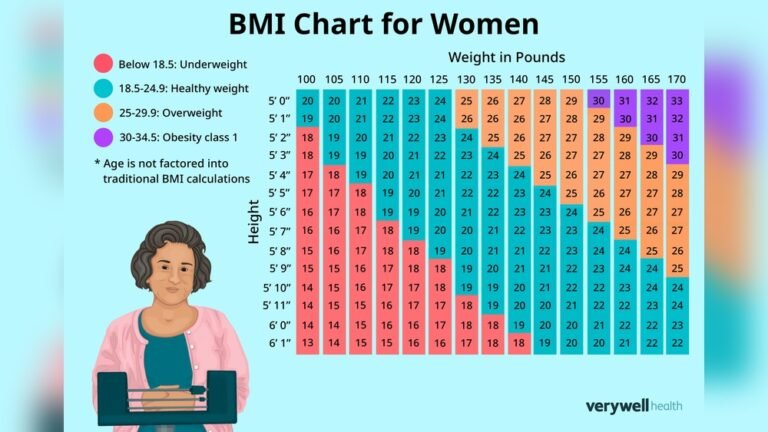Are you curious about what a good BMI for females really means for your health? Understanding your Body Mass Index (BMI) can be a simple yet powerful way to gauge if your weight is in a healthy range.
But it’s not just about numbers—it’s about how those numbers relate to your overall well-being and how you feel every day. You’ll discover the ideal BMI ranges for women, why these numbers matter, and what factors can influence your personal target.
Ready to learn how to take control of your health with clear, easy-to-follow information? Keep reading to find out what a good BMI means for you and how you can achieve it.

Credit: www.researchgate.net
Bmi Basics For Women
Understanding BMI basics helps women manage their health better. Body Mass Index, or BMI, is a simple tool. It gives a quick idea of whether weight is healthy for height.
BMI is not a full health measure. It does not check muscle, fat, or bone directly. Still, it offers a useful starting point for health awareness.
What Bmi Measures
BMI shows the ratio of weight to height. It estimates body fat but does not measure it exactly. The number helps spot if weight is low, normal, or high.
Doctors use BMI to screen for weight problems. It helps identify risks for diseases like diabetes and heart issues. BMI alone is not a diagnosis but a guide.
How To Calculate Bmi
To find BMI, divide weight in kilograms by height in meters squared. The formula is simple: BMI = weight (kg) ÷ height (m)².
For pounds and inches, multiply weight by 703, then divide by height squared. Many online calculators can do this instantly. Knowing how to calculate BMI helps track changes over time.
Bmi Categories Explained
BMI falls into categories that show health risk levels. Underweight is below 18.5. Normal weight ranges from 18.5 to 24.9. Overweight is 25 to 29.9. Obesity is 30 or above.
Each category signals different health advice. Normal BMI usually means lower risk of weight-related diseases. Higher BMI categories may need lifestyle changes and medical guidance.
Women should consider age, muscle, and ethnicity too. These factors affect what BMI means for each individual.

Credit: www.ramsayhealth.co.uk
Healthy Bmi Ranges By Age
Body Mass Index (BMI) helps measure healthy weight ranges for females across different ages. Age affects body composition and BMI interpretation. Understanding healthy BMI ranges by age supports better health choices and monitoring.
Bmi For Children And Teens
For girls under 20, BMI is age and sex specific. Doctors use BMI percentiles from growth charts. A healthy BMI falls between the 5th and 85th percentile. Below 5th percentile may indicate underweight. Above 85th percentile suggests overweight or obesity. This method accounts for natural growth and development.
Adult Female Bmi Standards
For women aged 20 to 59, BMI is calculated using weight and height. A BMI of 18.5 to 24.9 is considered healthy. Below 18.5 indicates underweight. Between 25 and 29.9 means overweight. A BMI of 30 or above signals obesity. These ranges help identify health risks related to weight.
Bmi Considerations For Older Women
For women over 60, BMI may not fully reflect health. Muscle loss and bone density changes affect BMI accuracy. A slightly higher BMI, around 25 to 27, may be healthier for older women. Medical advice is essential to assess overall health. Other measures like waist circumference can add insight.
Factors Affecting Female Bmi
Body Mass Index (BMI) is a common tool to assess body weight relative to height in women. Several factors affect female BMI beyond just weight and height. Understanding these factors helps interpret BMI more accurately for each woman. These influences include muscle mass, ethnicity, and certain medical conditions.
Impact Of Muscle Mass
Muscle weighs more than fat. Women with more muscle may have a higher BMI. This does not always mean excess fat or poor health. Athletes often show high BMI due to muscle density. BMI alone cannot distinguish muscle from fat. This can lead to misleading results for active women.
Ethnicity And Body Composition
Ethnicity affects how body fat is distributed. Different ethnic groups have varied bone density and fat patterns. Some women may have a healthy BMI but carry more fat in critical areas. Others might have a higher BMI but less fat overall. These differences impact health risk assessments tied to BMI.
Medical Conditions Influencing Bmi
Certain health conditions change body weight and composition. Thyroid problems can cause weight gain or loss. Hormonal imbalances may increase body fat or water retention. Some medications also affect weight or muscle mass. These factors alter BMI and must be considered for accurate health evaluation.
Bmi Limitations And Alternatives
BMI is a common tool to estimate body health for females. It uses height and weight to give a simple number. This number helps categorize weight status. Still, BMI has some limits that affect its accuracy. Other ways exist to check body health more closely. Understanding these limits and alternatives helps women make better health choices.
Why Bmi Isn’t Always Accurate
BMI does not separate muscle from fat. Muscular women may have high BMI but low body fat. It also ignores where fat is stored on the body. Fat around the belly is riskier than fat on hips. Age and bone density also affect BMI results. This means BMI can misclassify healthy or unhealthy status.
Other Methods To Assess Body Health
Body fat percentage shows fat compared to total weight. It gives a clearer picture than BMI alone. Waist circumference measures belly fat, linked to heart risks. Skinfold tests estimate fat under the skin at key spots. Bioelectrical impedance scales send a small current to measure fat. These methods add detail to health evaluation beyond BMI.
When To Seek Professional Advice
Consult a doctor or dietitian for a full health check. They can use tests that fit your body type and needs. Professionals consider medical history, lifestyle, and goals. They guide safe weight and health plans. Getting expert advice helps avoid errors from BMI alone.
Maintaining A Healthy Bmi
Maintaining a healthy BMI is essential for overall well-being. It helps reduce risks of chronic diseases and improves energy levels. A balanced BMI supports strong bones and a healthy heart. Keeping your BMI in a good range involves simple daily choices. Small changes in diet, exercise, and habits can make a big difference.
Diet Tips For Weight Management
Eat plenty of fruits and vegetables every day. Choose whole grains instead of refined ones. Limit sugary drinks and high-calorie snacks. Drink water regularly to stay hydrated and feel full. Control portion sizes to avoid overeating. Include lean proteins like chicken, fish, and beans. Avoid fast food and heavily processed meals.
Exercise Recommendations
Engage in at least 150 minutes of moderate exercise weekly. Walking, cycling, and swimming are great options. Include strength training twice a week to build muscle. Stretch regularly to improve flexibility and prevent injury. Find activities you enjoy to stay motivated. Exercise helps burn calories and boosts metabolism.
Lifestyle Habits That Support Healthy Weight
Get enough sleep, aiming for 7 to 9 hours each night. Manage stress through meditation, hobbies, or deep breathing. Avoid smoking and limit alcohol consumption. Stay active throughout the day, even with small movements. Set realistic goals and track your progress. Surround yourself with supportive friends and family for motivation.
Bmi And Weight-related Treatments
BMI plays a key role in deciding weight-related treatments for women. It helps doctors choose safe and effective options. Understanding BMI and treatment criteria improves health outcomes.
Many treatments rely on BMI to assess risks and benefits. These include medications and surgical options. Monitoring progress during treatment ensures safety and success.
Criteria For Medication Like Ozempic
Medications such as Ozempic are prescribed based on BMI and health conditions. Typically, women with a BMI over 30 qualify for such drugs. Those with a BMI over 27 and related health issues may also be eligible. Doctors evaluate overall health before prescribing to ensure safety.
Weight Loss Procedures And Bmi
Bariatric surgery often requires a minimum BMI of 35 with health problems. Some procedures need a BMI over 40 without other conditions. Surgery can help achieve significant weight loss when other methods fail. Careful evaluation is necessary to confirm eligibility and reduce risks.
Monitoring Progress Safely
Regular BMI checks track treatment effectiveness and health changes. Blood tests and physical exams support safe progress monitoring. Adjustments to medication or procedures happen based on results. Staying in touch with healthcare providers prevents complications and improves outcomes.

Credit: www.health.harvard.edu
Conclusion
Maintaining a good BMI supports overall health and well-being for women. A healthy BMI varies by age, muscle mass, and ethnicity. Use BMI as a general guide, not the only health measure. Regular check-ups with a healthcare provider ensure personalized advice.
Focus on balanced eating and regular physical activity for best results. Small, steady changes make a big difference over time. Keep your body strong and your mind positive. Your health is worth the effort every day.



